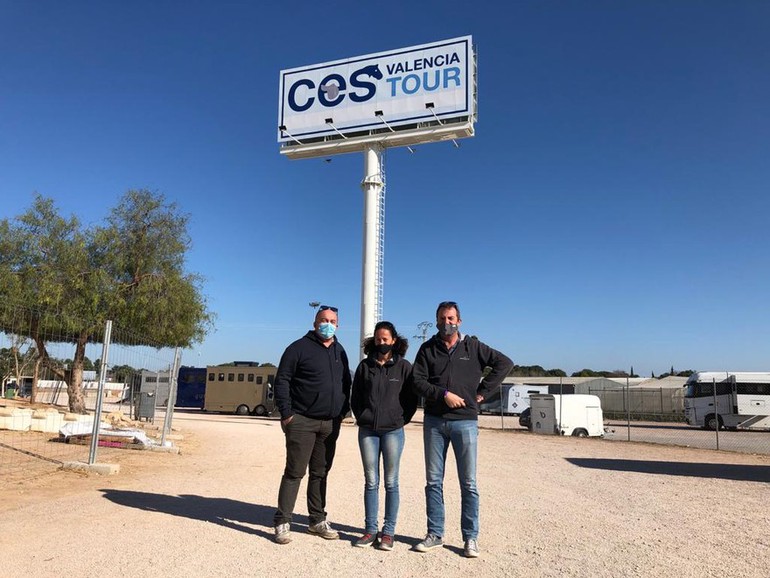Text © World of Showjumping
More than a hundred horses – and their riders – have for the last three weeks been stuck in the middle of the EHV-1 (neurological form) outbreak in Valencia, Spain. To assist them in this difficult situation, the French riders contacted Patrick Borg – the CEO of Borg Events and one of the most experienced stable managers on the circuit. Borg has worked at some of the biggest events world wide, and had the responsibility for the stabling at the 2016 Olympic Games in Rio de Janeiro.
“We arrived here in Valencia on Thursday last week,” Borg tells World of Showjumping from Spain. “The French Equestrian Federation put us in charge of this operation. We were in the south of France, getting ready for the show in Vidauban, when I got phone calls from Valencia, asking to find a solution for everyone stuck on the showground. It was a difficult situation, and after a few more phone calls I took two members of my team, got in my car and drove down. We had no idea what to expect upon arrival; we did not know what would meet us.”
“When we came there, we spoke with everyone,” Borg says. “What was clear was that we arrived in the aftermath of a huge crisis. The first thing we did, was to warn the local organising committee about the risks of contamination as all the horses were stabled together. We are not a security company and we are not vets, but we have experience. To start with, we created a process for everyone to follow, to make sure to stop the contamination onsite. Now, the new stables are here, and asymptomatic horses are separated – we don’t have massive groups together anymore. All horses have fresh air and sun, and they have place to walk.”
“What we also saw, was that a lot of the horses had different problems – the virus had led to several side-effects,” Borg says.
Teamwork has been essential to improve the situation, Borg highlights. “It is important to know that all the riders have worked together to find good solutions,” he says. “They have really tried and have taken charge of the situation. Carl-Walter Fox has communicated with the organising committee and the vets, and he has done a huge job.”
Borg has worked closely with the French Equestrian Federation to find a way to get the horses to a biosecure quarantine stable in France. “The first convoy with ten French horses left on Friday morning at 5am, with two trucks,” Borg tells. “This is good: With the example of the French federation, the gates are opened for others to follow. All the protocols are validated by the authorities and now the Belgian and German horses can leave following the same process. The problem in this regard is not the organising committee here; it is on the level of the national ministries, as the needed protocols vary from ministry to ministry. Each federation has to work with their own national ministry to find a solution for a quarantine in their home country. The biggest problem with the transit has been to find safe stop-over stables. In France, we have two places provided by the French federation. We have vets there to check the horses on arrival and departure, and strict biosecurity measures in place.”
Borg has organised and followed the French horses over their transit stable to the quarantine outside Paris. “The protocol is approved by both the French and Spanish ministries and the ten horses in the first convoy are now in quarantine in France,” he explains. “Now, we are back in Valencia to organise the transport for the rest of the horses. At the moment the French federation has 14 horses onsite, in total we have 135 horses. The situation has calmed down: The next weeks we should try to get the horses that can travel to their homes. However, onsite, we still have some very sick horses, and the vets have a lot to do. As some of the horses are not fit enough to travel, it is hard to know when this all will be over though.”
“The mission given me from the French federation is clear: I will remain here until all the French horses have left”, Borg answers when asked how long he is going to stay in Valencia. “On paper, they can leave – the French and Spanish ministries have approved this. However, we don’t want to put a horse on a truck if it is not totally fit to travel. This is the main point: We are here for the horses. Everyone understands that. And none of the horses are going on a truck unwell. The job of the vets is to stabilise the horses, and make sure they can travel safely to be further quarantined in their home countries.”
“The situation has improved, but we are still far from the end,” Borg says. “We were not here at the start of this crisis and cannot take sides. Personally, I think many people have done a great job and I don’t want to get into the political issues. At this moment, the question is no longer about what we need here, but how long we have to stay as we don’t know when the other federations are allowed to move their horses. Everything has to be done step by step, and the political situation keeps changing. We cannot say that the crisis is over: We are definitely still in the tunnel, but we do see the light – although far away.”









